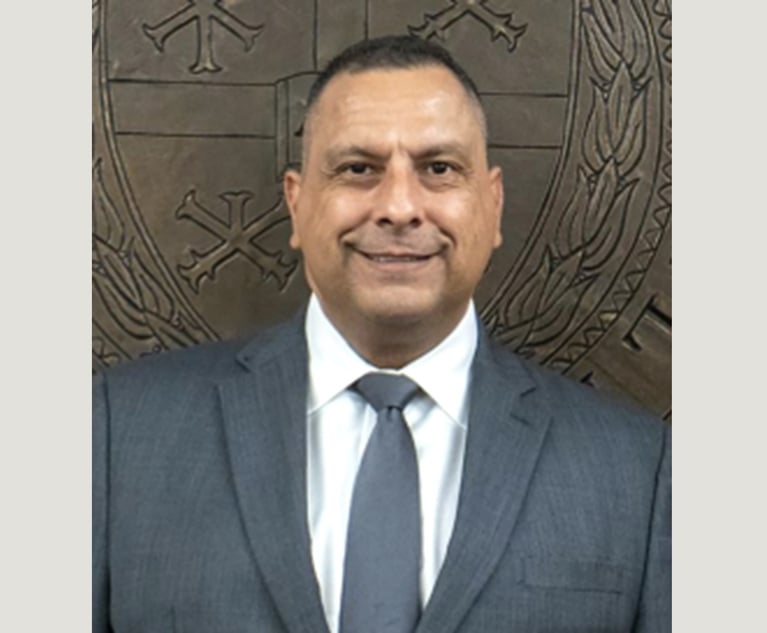 Image: Shutterstock
Image: ShutterstockBehind on Collections? E-Biller Lets Firms Hit Late Payers With Interest Fees
Headnote CEO Sarah Schaaf said midsize law firm are clamoring for the service, calling it a sign of their growing business savvy. "This is about incentivizing on-time payments, not about making more money," she said.
September 24, 2019 at 03:49 PM
3 minute read
Sarah Schaaf, founder and CEO of e-billing platform Headnote, believes that attorneys in small and midsize firms are finally beginning to treat the law as a business.
One clear sign of that? While she built Headnote as a stripped-down platform that eschews complex features irrelevant to smaller operations, she's prioritized adding components in response to user demand. The single-most requested addition, she said, has been a function allowing firms to slap interest rates on late payments.
Consequently, Headnote, which targets firms under 100 attorneys, with its core business in the 20 to 50 range, says it's poised to be the first e-biller to provide the capability to charge interest.
"My dad, who recently retired, used to say something along the lines of 'A good lawyer doesn't collect. The job is to be there on same side of the table, help them through a hard time, a traumatic time.' All of that is true," said Schaaf, who is a lawyer herself. "But this is about incentivizing on-time payments, not about making more money."
Schaaf added that while late payments are standard in the legal industry, that does not have to be the case. Other industries are more successful in ensuring prompt payment not because consumers are better organized, but because they are penalized if they don't comply.
Although lawyers have historically resorted to discounts or write-offs when dealing with late payments, there is wide agreement that they are within their rights to charge interest, as long as this is agreed on at the start of a representation. (Some jurisdictions also allow lawyers to revisit fee arrangements and seek interest for future work in the event of existing unpaid bills.)
"People are looking at what other businesses … do, and how come they work so much better than ours," she said.
Schaaf emphasized that Headnote urges customers to be on top of the rules in their jurisdiction with regard to the particularities of interest fees. But she indicated that some firms are already being proactive about the matter, pointing to a conversation she had with a client at a midsized firm.
"The issue is that we have hundreds of clients and invoices that go out monthly. We don't have the bandwidth to manually add interest to each invoice and then aggregate those interest charges over time," the client said. "Having the ability to automatically add and track interest charges to overdue invoices would be a game changer for us, and would likely result in our clients paying on time much more often than they do today."
This content has been archived. It is available through our partners, LexisNexis® and Bloomberg Law.
To view this content, please continue to their sites.
Not a Lexis Subscriber?
Subscribe Now
Not a Bloomberg Law Subscriber?
Subscribe Now
NOT FOR REPRINT
© 2025 ALM Global, LLC, All Rights Reserved. Request academic re-use from www.copyright.com. All other uses, submit a request to [email protected]. For more information visit Asset & Logo Licensing.
You Might Like
View All
Husch Blackwell Hires Former Adobe Counsel to Oversee AI Advisory Offering
3 minute read
'Taking the Best' of Both Firms, Ballard Spahr and Lane Powell Officially Merge
6 minute read
Bracewell Adds Former Pioneer Natural Resources Lawyer to O&G, Energy Transition Practices
2 minute read
Trending Stories
Who Got The Work
Michael G. Bongiorno, Andrew Scott Dulberg and Elizabeth E. Driscoll from Wilmer Cutler Pickering Hale and Dorr have stepped in to represent Symbotic Inc., an A.I.-enabled technology platform that focuses on increasing supply chain efficiency, and other defendants in a pending shareholder derivative lawsuit. The case, filed Oct. 2 in Massachusetts District Court by the Brown Law Firm on behalf of Stephen Austen, accuses certain officers and directors of misleading investors in regard to Symbotic's potential for margin growth by failing to disclose that the company was not equipped to timely deploy its systems or manage expenses through project delays. The case, assigned to U.S. District Judge Nathaniel M. Gorton, is 1:24-cv-12522, Austen v. Cohen et al.
Who Got The Work
Edmund Polubinski and Marie Killmond of Davis Polk & Wardwell have entered appearances for data platform software development company MongoDB and other defendants in a pending shareholder derivative lawsuit. The action, filed Oct. 7 in New York Southern District Court by the Brown Law Firm, accuses the company's directors and/or officers of falsely expressing confidence in the company’s restructuring of its sales incentive plan and downplaying the severity of decreases in its upfront commitments. The case is 1:24-cv-07594, Roy v. Ittycheria et al.
Who Got The Work
Amy O. Bruchs and Kurt F. Ellison of Michael Best & Friedrich have entered appearances for Epic Systems Corp. in a pending employment discrimination lawsuit. The suit was filed Sept. 7 in Wisconsin Western District Court by Levine Eisberner LLC and Siri & Glimstad on behalf of a project manager who claims that he was wrongfully terminated after applying for a religious exemption to the defendant's COVID-19 vaccine mandate. The case, assigned to U.S. Magistrate Judge Anita Marie Boor, is 3:24-cv-00630, Secker, Nathan v. Epic Systems Corporation.
Who Got The Work
David X. Sullivan, Thomas J. Finn and Gregory A. Hall from McCarter & English have entered appearances for Sunrun Installation Services in a pending civil rights lawsuit. The complaint was filed Sept. 4 in Connecticut District Court by attorney Robert M. Berke on behalf of former employee George Edward Steins, who was arrested and charged with employing an unregistered home improvement salesperson. The complaint alleges that had Sunrun informed the Connecticut Department of Consumer Protection that the plaintiff's employment had ended in 2017 and that he no longer held Sunrun's home improvement contractor license, he would not have been hit with charges, which were dismissed in May 2024. The case, assigned to U.S. District Judge Jeffrey A. Meyer, is 3:24-cv-01423, Steins v. Sunrun, Inc. et al.
Who Got The Work
Greenberg Traurig shareholder Joshua L. Raskin has entered an appearance for boohoo.com UK Ltd. in a pending patent infringement lawsuit. The suit, filed Sept. 3 in Texas Eastern District Court by Rozier Hardt McDonough on behalf of Alto Dynamics, asserts five patents related to an online shopping platform. The case, assigned to U.S. District Judge Rodney Gilstrap, is 2:24-cv-00719, Alto Dynamics, LLC v. boohoo.com UK Limited.
Featured Firms
Law Offices of Gary Martin Hays & Associates, P.C.
(470) 294-1674
Law Offices of Mark E. Salomone
(857) 444-6468
Smith & Hassler
(713) 739-1250








